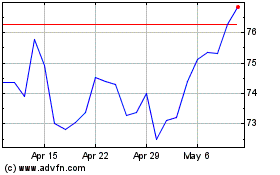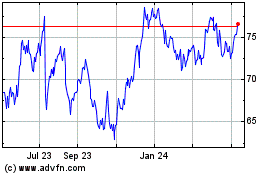SHANGHAI—Investors are betting the Chinese yuan will continue
its recent slide against the dollar, despite U.S. President-elect
Donald Trump's past criticism of China's currency policies.
After regularly hitting multiyear lows in recent weeks, the yuan
extended its fall against the dollar Thursday in China's domestic
market, at one point prompting what traders described as an
intervention by the Chinese central bank to support the currency.
The yuan also fell sharply against the dollar overnight in offshore
markets, where it trades more freely, although it recovered some
ground in Asian trading hours.
The market moves suggest investors have so far chosen to
discount Mr. Trump's threat during the presidential campaign to
label Beijing a currency manipulator for its alleged practice of
keeping the yuan undervalued. Instead, many expect the yuan to keep
sliding, in response to broader themes such as the malaise of
China's economy and the dollar's recent strength.
Yet while Beijing may be happy to see the yuan keep falling to
help boost the country's exports, it could face a more difficult
balancing act on the currency following Mr. Trump's election win.
The president-elect's frustration with China's policies, together
with Beijing's own fear of people trying to ship more money
offshore, could make Chinese leaders hesitant to let the currency
weaken much faster.
"The overall, longer-term trend of yuan depreciation won't be
changed by Trump's victory but Beijing also can't afford to let its
currency fall too fast and risk even more capital outflows," said
Peter Zhao, chief executive of Eagle Investments (Shanghai) Co., a
private-equity fund.
The action in China's currency markets on Thursday demonstrated
some of the pressures Beijing now faces.
The People's Bank of China set the yuan's reference exchange
rate at 6.7885 to the U.S. dollar, compared with 6.7832 Wednesday—a
fresh six-year low for the Chinese currency. Even so, many expected
the yuan to have weakened further.
"Based on our own models, the consensus across trading desks
this morning is that the fixing should be around at least 6.8000,
which again suggests that the central bank wants to control the
pace of yuan depreciation," said a Guangzhou-based head of currency
trading at a domestic bank.
In China's tightly controlled currency market, the yuan is
allowed to trade 2% higher or lower than the fixing. When trading
began, the dollar quickly rose to an intraday high of 6.7990,
outpacing the drop in the reference exchange rate.
Soon after, a "mysterious" dollar selling order at 6.8000 from
one of China's biggest state banks surfaced on traders' screens,
sending a strong signal to many that the central bank intends to
cap the exchange rate below that level, said the head of the
trading desk.
"People all got the message because this big bank regularly acts
as the PBOC's agent bank in the latter's market intervention," he
added.
The Chinese central bank didn't immediately respond to a request
for comment. The yuan has since slipped back to 6.7905 against the
dollar.
"With China there's multiple angles to the Trump effect," said
Bart Wakabayashi, head of Hong Kong foreign-exchange sales for
State Street Global Markets. "But the message from the People's
Bank of China is they want the market to think it's not a one-way
downward bet." Mr. Wakabayashi said he expects the yuan now to head
gradually toward 7.00 against the U.S. dollar.
Despite the central bank's efforts to slow the yuan's drop, and
the looming Trump administration, many within China agree.
Duan Shihao, a 30-year-old employee of a metal-production
company based in the eastern coastal city of Yantai, said he
expected the yuan to keep depreciating, based on his perception of
the Chinese economy's weakness as he travels around the country for
work.
Still, Mr. Duan said he hasn't been able to express his bullish
dollar view by purchasing more greenbacks due to China's tightened
restrictions on individuals buying foreign currency.
"Sometimes when I go to a bank, they would tell me that they
have run out of dollar notes," he said.
Some analysts meanwhile say Mr. Trump's perceived hard-line
stance on China's currency policy may have been exaggerated.
"Logically speaking, the actual chances of labeling China as a
currency manipulator are fairly low, at least based on China's
economic fundamentals," said Ying Gu, currency strategist at J.P.
Morgan in Hong Kong.
In its most recent assessment last month, the U.S. Treasury said
China now meets only one of the three criteria which would lead it
to label a country a currency manipulator, compared with two in its
prior report in April.
"[Mr.] Trump is a businessman and he will talk business with
China. He may very well just use his various threats as a
bargaining tool to push Beijing to open up its financial sector to
American businesses," said Eagle Investments' Mr. Zhao.
Qian Junya contributed to this article.
Write to Shen Hong at hong.shen@wsj.com and Gregor Stuart Hunter
at gregor.hunter@wsj.com
(END) Dow Jones Newswires
November 10, 2016 06:55 ET (11:55 GMT)
Copyright (c) 2016 Dow Jones & Company, Inc.
State Street (NYSE:STT)
Historical Stock Chart
From Jun 2024 to Jul 2024

State Street (NYSE:STT)
Historical Stock Chart
From Jul 2023 to Jul 2024
